牛津译林版(2020)必修第二册Unit 3 Festivals and Customs 复习课件1 (共16张PPT)
文档属性
| 名称 | 牛津译林版(2020)必修第二册Unit 3 Festivals and Customs 复习课件1 (共16张PPT) |
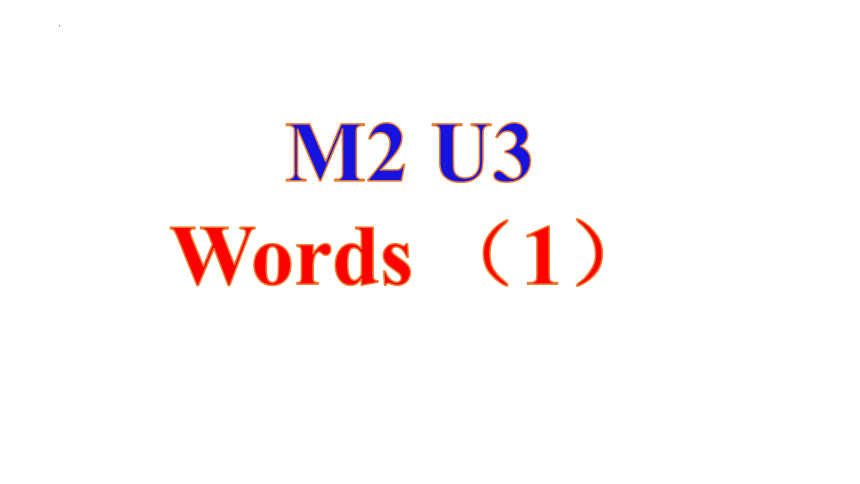
|
|
| 格式 | pptx | ||
| 文件大小 | 248.6KB | ||
| 资源类型 | 教案 | ||
| 版本资源 | 牛津译林版(2019) | ||
| 科目 | 英语 | ||
| 更新时间 | 2023-08-11 19:09:02 | ||
图片预览

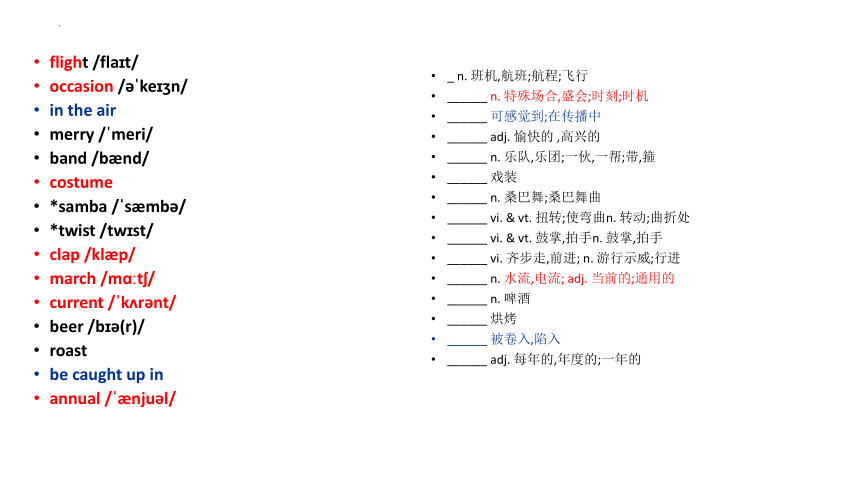
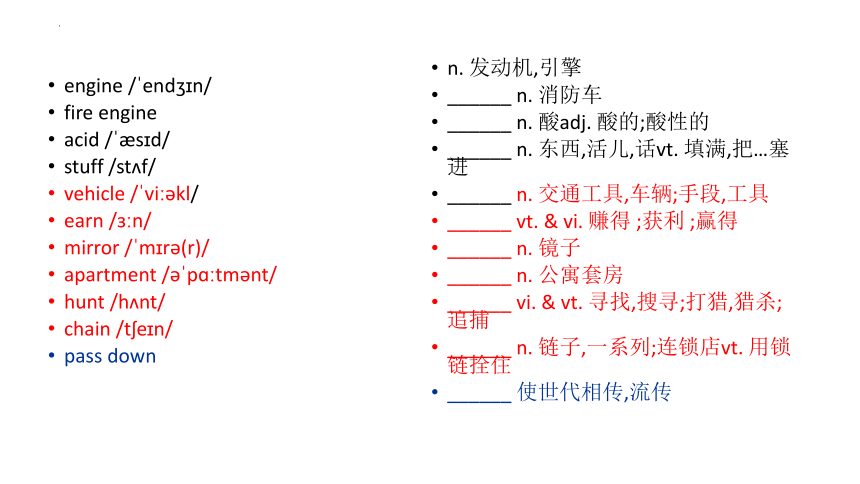
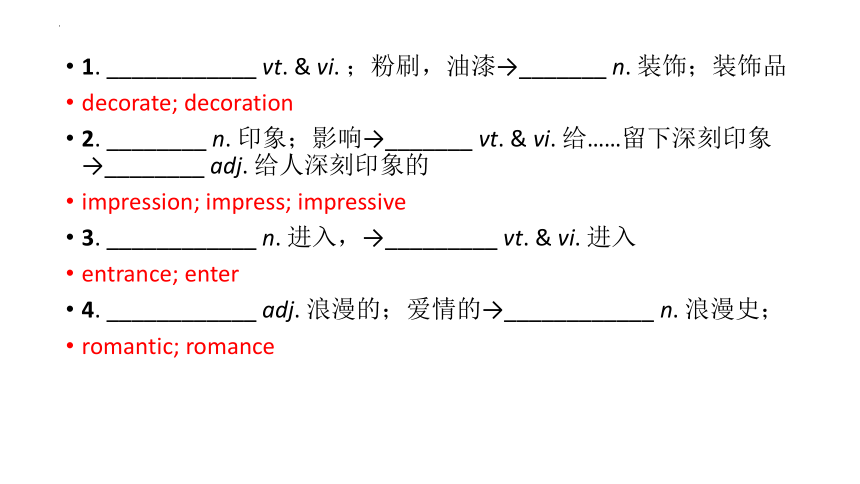
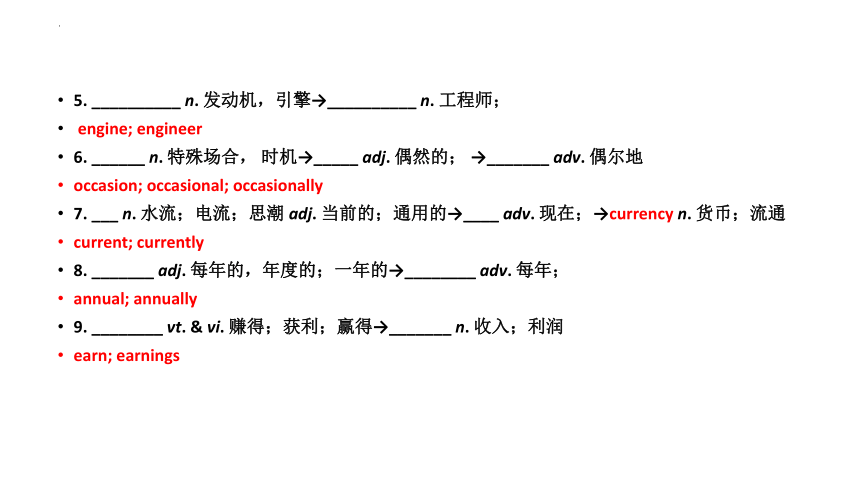
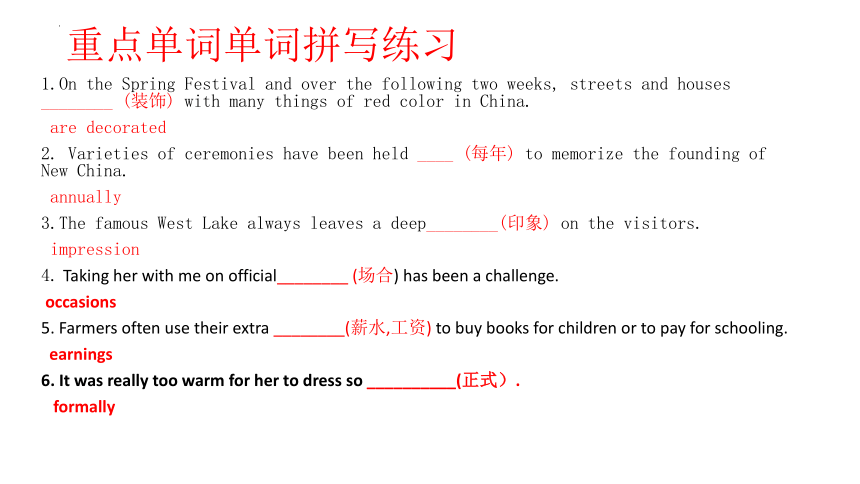

文档简介
(共16张PPT)
M2 U3 Words (1)
flight /fla t/
occasion / ke n/
in the air
merry / meri/
band /b nd/
costume
*samba / s mb /
*twist /tw st/
clap /kl p/
march /mɑ t /
current / k r nt/
beer /b (r)/
roast
be caught up in
annual / nju l/
_ n. 班机,航班;航程;飞行
______ n. 特殊场合,盛会;时刻;时机
______ 可感觉到;在传播中
______ adj. 愉快的 ,高兴的
______ n. 乐队,乐团;一伙,一帮;带,箍
______ 戏装
______ n. 桑巴舞;桑巴舞曲
______ vi. & vt. 扭转;使弯曲n. 转动;曲折处
______ vi. & vt. 鼓掌,拍手n. 鼓掌,拍手
______ vi. 齐步走,前进; n. 游行示威;行进
______ n. 水流,电流; adj. 当前的;通用的
______ n. 啤酒
______ 烘烤
______ 被卷入,陷入
______ adj. 每年的,年度的;一年的
engine / end n/
fire engine
acid / s d/
stuff /st f/
vehicle / vi kl/
earn / n/
mirror / m r (r)/
apartment / pɑ tm nt/
hunt /h nt/
chain /t e n/
pass down
n. 发动机,引擎
______ n. 消防车
______ n. 酸adj. 酸的;酸性的
______ n. 东西,活儿,话vt. 填满,把…塞进
______ n. 交通工具,车辆;手段,工具
______ vt. & vi. 赚得 ;获利 ;赢得
______ n. 镜子
______ n. 公寓套房
______ vi. & vt. 寻找,搜寻;打猎,猎杀;追捕
______ n. 链子,一系列;连锁店vt. 用锁链拴住
______ 使世代相传,流传
1. ____________ vt. & vi. ;粉刷,油漆→_______ n. 装饰;装饰品
decorate; decoration
2. ________ n. 印象;影响→_______ vt. & vi. 给……留下深刻印象→________ adj. 给人深刻印象的
impression; impress; impressive
3. ____________ n. 进入,→_________ vt. & vi. 进入
entrance; enter
4. ____________ adj. 浪漫的;爱情的→____________ n. 浪漫史;
romantic; romance
5. __________ n. 发动机,引擎→__________ n. 工程师;
engine; engineer
6. ______ n. 特殊场合, 时机→_____ adj. 偶然的; →_______ adv. 偶尔地
occasion; occasional; occasionally
7. ___ n. 水流;电流;思潮 adj. 当前的;通用的→____ adv. 现在;→currency n. 货币;流通
current; currently
8. _______ adj. 每年的,年度的;一年的→________ adv. 每年;
annual; annually
9. ________ vt. & vi. 赚得;获利;赢得→_______ n. 收入;利润
earn; earnings
重点单词单词拼写练习
1.On the Spring Festival and over the following two weeks, streets and houses ________ (装饰) with many things of red color in China.
are decorated
2. Varieties of ceremonies have been held ____ (每年) to memorize the founding of New China.
annually
3.The famous West Lake always leaves a deep________(印象) on the visitors.
impression
4. Taking her with me on official________ (场合) has been a challenge.
occasions
5. Farmers often use their extra ________(薪水,工资) to buy books for children or to pay for schooling.
earnings
6. It was really too warm for her to dress so __________(正式).
formally
7. You can use the attractive cards for any special o________—weddings, births, birthdays, Christmas or anniversaries, etc..
occasion
8. Which departments do you c________ communicate with
currently
9. Today some t customs are still observed in rural areas of China, but they have been weakened in urban cities.
traditional
10. In the mid 19th century, r________ emotions about love were expressed in poems, stories, art and music.
romantic
11. I had already missed my ________(航班), and the next one wasn't until the following morning.
flight
12. On 22nd April 1970, millions of Americans and thousands of students ________ (游行示威) in protest of the terrible situation of the environment.
marched
13. The most important thing about my job is that I help protect ________ (普通的) people from one of the most powerful forces on earth—the volcano.
ordinary
14. Have you ever dreamt of being in front of thousands of people at a concert, with everyone _________(鼓掌) while you were singing
clapping
anything but, be caught up in, pass down, in the air ,leave a deep impression on, by tradition; have two left feet, on occasions, earn a living
1.The drama put on by my classmates ___________ us. Every one of us thought their show was a great success.
left a deep impression on
2. Because the whole town went against plans to build a new shopping center, that proposal is now up ___.
in the air
3.Older people are less likely to _____ emotions and more likely to focus on the positive, ignoring the negative.
be caught up in
4.They were friendly off camera, refusing even to take the same lift.
anything but
5. In the past few decades many immigrants have ________ in America by doing varieties of jobs.
earned a living
6. I never learn to dance because I __________ and become troubled.
had two left feet
7.Humans ___________ their skills and knowledge to the next generations through education.
pass down
8.When introduced to strangers, ______________, Europeans and Americans shake hands.
by tradition
shall/will do
be going to do
be to do
be about to do
be doing
Future in the past 过去将来时
would/should do
was/were going to do
was/were to do
was/were about to do
was/were doing
He said that he _______(answer) the door .
would answer
He said that he ___________(write )to Henry the next day.
was going to write
He said that your plan _______ (be) a failure.
was to be
Exploring the rules
We use future in the past to describe an action (1) _____________ (in the future/in the past) from the perspective of some point (2) _____________ (in the future/in the past).
in the future
in the past
Present
Future in the past
Past
Future
过去将来时
用法
常用于主句谓语动词为过去时态的宾语从句中。
时间状语
the next day (month/ year),the following day(month/year),soon等。
意义
过去某个时间看来将要发生的动作或存在的状态。
1.We ____________ (turn) off the radio and get into our sleeping bags when strong winds suddenly began to blow.
were about to turn
2. —Tom, you didn't come to the party last night.
—I ____________, but I suddenly remembered I had homework to do.
was going to
3. This morning I thought I ______________ (have) a talk with you tonight.
was going to have
4.James has just arrived, but I didn’t know he _______ until yesterday.
A.will come B.was coming C.had come D.Came
5. He promised he ______ (not make) the same mistake again.
wouldn’t make
6. It was announced that only after the candidates’ papers were collected _____to leave the room.
A.had they been permitted B.would they be permitted
C.that they would be permitted D.that they had been permitted
7.火车马上要出站了。
The train ________ ________ ________ pull out of the station.
was about to
8.妈妈叫我多穿点儿因为马上要下雪了。
My mother told me to wear more because it _______ ________ _______ snow.
was going to
9.他说他将在八点钟出发去武汉。
He said he ______ _______for Wuhan at eight o’clock.
was leaving
10.我正要关电脑,这时收到了一封电子邮件。
I ______ ______ ______ ______ ______ the computer when I received an email.
was about to turn off
11.他说他将在八点钟到达这里。
He said he________ ________ ________at eight o'clock.
would be here
M2 U3 Words (1)
flight /fla t/
occasion / ke n/
in the air
merry / meri/
band /b nd/
costume
*samba / s mb /
*twist /tw st/
clap /kl p/
march /mɑ t /
current / k r nt/
beer /b (r)/
roast
be caught up in
annual / nju l/
_ n. 班机,航班;航程;飞行
______ n. 特殊场合,盛会;时刻;时机
______ 可感觉到;在传播中
______ adj. 愉快的 ,高兴的
______ n. 乐队,乐团;一伙,一帮;带,箍
______ 戏装
______ n. 桑巴舞;桑巴舞曲
______ vi. & vt. 扭转;使弯曲n. 转动;曲折处
______ vi. & vt. 鼓掌,拍手n. 鼓掌,拍手
______ vi. 齐步走,前进; n. 游行示威;行进
______ n. 水流,电流; adj. 当前的;通用的
______ n. 啤酒
______ 烘烤
______ 被卷入,陷入
______ adj. 每年的,年度的;一年的
engine / end n/
fire engine
acid / s d/
stuff /st f/
vehicle / vi kl/
earn / n/
mirror / m r (r)/
apartment / pɑ tm nt/
hunt /h nt/
chain /t e n/
pass down
n. 发动机,引擎
______ n. 消防车
______ n. 酸adj. 酸的;酸性的
______ n. 东西,活儿,话vt. 填满,把…塞进
______ n. 交通工具,车辆;手段,工具
______ vt. & vi. 赚得 ;获利 ;赢得
______ n. 镜子
______ n. 公寓套房
______ vi. & vt. 寻找,搜寻;打猎,猎杀;追捕
______ n. 链子,一系列;连锁店vt. 用锁链拴住
______ 使世代相传,流传
1. ____________ vt. & vi. ;粉刷,油漆→_______ n. 装饰;装饰品
decorate; decoration
2. ________ n. 印象;影响→_______ vt. & vi. 给……留下深刻印象→________ adj. 给人深刻印象的
impression; impress; impressive
3. ____________ n. 进入,→_________ vt. & vi. 进入
entrance; enter
4. ____________ adj. 浪漫的;爱情的→____________ n. 浪漫史;
romantic; romance
5. __________ n. 发动机,引擎→__________ n. 工程师;
engine; engineer
6. ______ n. 特殊场合, 时机→_____ adj. 偶然的; →_______ adv. 偶尔地
occasion; occasional; occasionally
7. ___ n. 水流;电流;思潮 adj. 当前的;通用的→____ adv. 现在;→currency n. 货币;流通
current; currently
8. _______ adj. 每年的,年度的;一年的→________ adv. 每年;
annual; annually
9. ________ vt. & vi. 赚得;获利;赢得→_______ n. 收入;利润
earn; earnings
重点单词单词拼写练习
1.On the Spring Festival and over the following two weeks, streets and houses ________ (装饰) with many things of red color in China.
are decorated
2. Varieties of ceremonies have been held ____ (每年) to memorize the founding of New China.
annually
3.The famous West Lake always leaves a deep________(印象) on the visitors.
impression
4. Taking her with me on official________ (场合) has been a challenge.
occasions
5. Farmers often use their extra ________(薪水,工资) to buy books for children or to pay for schooling.
earnings
6. It was really too warm for her to dress so __________(正式).
formally
7. You can use the attractive cards for any special o________—weddings, births, birthdays, Christmas or anniversaries, etc..
occasion
8. Which departments do you c________ communicate with
currently
9. Today some t customs are still observed in rural areas of China, but they have been weakened in urban cities.
traditional
10. In the mid 19th century, r________ emotions about love were expressed in poems, stories, art and music.
romantic
11. I had already missed my ________(航班), and the next one wasn't until the following morning.
flight
12. On 22nd April 1970, millions of Americans and thousands of students ________ (游行示威) in protest of the terrible situation of the environment.
marched
13. The most important thing about my job is that I help protect ________ (普通的) people from one of the most powerful forces on earth—the volcano.
ordinary
14. Have you ever dreamt of being in front of thousands of people at a concert, with everyone _________(鼓掌) while you were singing
clapping
anything but, be caught up in, pass down, in the air ,leave a deep impression on, by tradition; have two left feet, on occasions, earn a living
1.The drama put on by my classmates ___________ us. Every one of us thought their show was a great success.
left a deep impression on
2. Because the whole town went against plans to build a new shopping center, that proposal is now up ___.
in the air
3.Older people are less likely to _____ emotions and more likely to focus on the positive, ignoring the negative.
be caught up in
4.They were friendly off camera, refusing even to take the same lift.
anything but
5. In the past few decades many immigrants have ________ in America by doing varieties of jobs.
earned a living
6. I never learn to dance because I __________ and become troubled.
had two left feet
7.Humans ___________ their skills and knowledge to the next generations through education.
pass down
8.When introduced to strangers, ______________, Europeans and Americans shake hands.
by tradition
shall/will do
be going to do
be to do
be about to do
be doing
Future in the past 过去将来时
would/should do
was/were going to do
was/were to do
was/were about to do
was/were doing
He said that he _______(answer) the door .
would answer
He said that he ___________(write )to Henry the next day.
was going to write
He said that your plan _______ (be) a failure.
was to be
Exploring the rules
We use future in the past to describe an action (1) _____________ (in the future/in the past) from the perspective of some point (2) _____________ (in the future/in the past).
in the future
in the past
Present
Future in the past
Past
Future
过去将来时
用法
常用于主句谓语动词为过去时态的宾语从句中。
时间状语
the next day (month/ year),the following day(month/year),soon等。
意义
过去某个时间看来将要发生的动作或存在的状态。
1.We ____________ (turn) off the radio and get into our sleeping bags when strong winds suddenly began to blow.
were about to turn
2. —Tom, you didn't come to the party last night.
—I ____________, but I suddenly remembered I had homework to do.
was going to
3. This morning I thought I ______________ (have) a talk with you tonight.
was going to have
4.James has just arrived, but I didn’t know he _______ until yesterday.
A.will come B.was coming C.had come D.Came
5. He promised he ______ (not make) the same mistake again.
wouldn’t make
6. It was announced that only after the candidates’ papers were collected _____to leave the room.
A.had they been permitted B.would they be permitted
C.that they would be permitted D.that they had been permitted
7.火车马上要出站了。
The train ________ ________ ________ pull out of the station.
was about to
8.妈妈叫我多穿点儿因为马上要下雪了。
My mother told me to wear more because it _______ ________ _______ snow.
was going to
9.他说他将在八点钟出发去武汉。
He said he ______ _______for Wuhan at eight o’clock.
was leaving
10.我正要关电脑,这时收到了一封电子邮件。
I ______ ______ ______ ______ ______ the computer when I received an email.
was about to turn off
11.他说他将在八点钟到达这里。
He said he________ ________ ________at eight o'clock.
would be here
